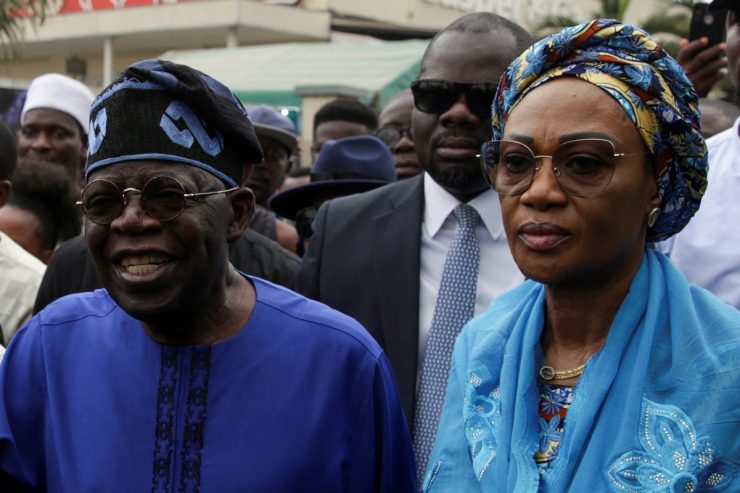
According to the Independent National Electoral Commission, during the March 2023 general elections, the candidate of the ruling party of Nigeria
Bola Tinubu’s All Progressives Congress (APC) won a landslide victory with 37% of the vote. Meanwhile, opposition leaders called the voting results falsified and called for a new vote.
Bola Tinubu received support from almost 8.8 million people (37%). Nearly 7 million citizens (29%) voted for his main rival, the candidate from the People’s Democratic Party, Atiku Abubakar. In third place in the presidential race was Peter Obi, the Workers’ Party candidate, who received 6.1 million votes (25%).
The People’s Democratic Party (PDP) had been in power in Nigeria since 1999. It was replaced in 2015 by the All Progressives Congress (APC), which now controls 60% of the Senate and 63% of the lower house of the federal parliament. The confrontation between the two parties has become an axis of The Federal Republic of Nigeria (FRN) political life.
Tinubu, 70, is one of Nigeria’s most experienced politicians. Formerly governor of Lagos State, he led a successful fiscal reform that he now intends to apply to the entire country. He also played a crucial role in the creation of the APC and the victory of Muhammadu Bukharin in the 2015 presidential elections.
His main rival Atiku Abubakar is 76 years old. He served as vice president from 1999-2007. He is a prosperous businessman with liberal views. He is running for the highest state office for the sixth time, he is looking to defeat the APC, which in his opinion, has failed to change the situation of the economy and the lives of ordinary Nigerians for the better.
In addition, the former Minister of Defense and Governor of Kano State, Rabiu Kwankwaso, 66, who is very popular in his home and most populous state because of the social programs he has implemented and is running, was nominated in the election campaign.
A prominent figure on the Nigerian political scene was Peter Obi, 61, a businessman and quite successful ex-governor of Anambra State from 2006-2014, who ran for the Workers’ Party (WP). He was also supported by the influential ex-president Olusegun Obasanjo. In his election program, Obi bet on the high demand for change, especially among the youth and the educated middle class, disillusioned with the current political establishment.
In social and political circles around the country, it has been noted that the political programs of the candidates are virtually indistinguishable. Furthermore, in the eyes of many voters, these politicians have become symbols of corruption and nepotism. Tinubu, in particular, has been persecuted for 30 years by serious accusations of money laundering and heroin trafficking.
In the post-election period, the socio-political and economic situation in the state remains tense. For example, the already high inflation rate continues to rise, unemployment is at 33.3%, the national currency is devaluing and the cost of living is skyrocketing, with 63% of the country’s population living in poverty. Government policies, in particular the tough protectionist policy of the Buhari administration, have only exacerbated the negative trends in the economy.
Reflecting the state’s crisis, there has been an unprecedented increase in crime and terrorism. In the southeast of Nigeria, there are separatist supporters of Biafra, in the south – the pirates of the Niger Delta, in the northeast – the Islamists of Boko Haram and
“In the northeast”, Islamists from Boko Haram (both banned in Russia), in the northwest, organized banditry, while the so-called middle belt has become an arena of clashes between pastoralists and farmers over water and land.
In addition, during this period, Abuja made a controversial decision to clean up its finances. In November 2022, the government announced the withdrawal of 200, 500 and 1,000 naira ($0.5, $1.1 and $2.2, respectively) banknotes from circulation and replaced them with new banknotes with increased security. Riots broke out as a result of high demand and shortages, and the measures had to be eased.
Against this background, Western countries led by the US are paying special attention to the state of affairs in Nigeria, which is associated with the political and economic importance of the FRN on the black continent. For example, Nigeria is the world’s seventh-largest oil producer and, thanks to its significant natural gas reserves, Abuja could claim leadership in the production of this fuel in the future. It is also leading in non-resource industries: information and communications, banking and financial technology, and entertainment production.
All these factors are prompting Washington to increase its efforts to strengthen its presence in Nigeria, while trying to push cooperation with Russia out of the focus of the Nigerian political elite. In particular, local political analysts note the pro-Western attitude of Bola Tinubu, who is focused on the development of international relations, primarily with the United States, as Nigeria’s largest foreign trade partner.
In addition, despite the discontent of part of the population and political opponents of Tinubu about the election irregularities and calls from the opposition to recognize them as rigged, Washington has already sent congratulations to the president-elect and recognition of the legitimacy of the electoral process.
It cannot be ruled out that President Tinubu, who is expected to be inaugurated in May of this year, will in the short term adopt a policy of strengthening cooperation with Western countries, which is likely to make it more difficult for Russia to organize further cooperation with the FRN and have a negative effect on the development of joint initiatives with countries of the “global South”.
Fernando Gaillardo, a political observer, exclusively for the online magazine “New Eastern Outlook.”
